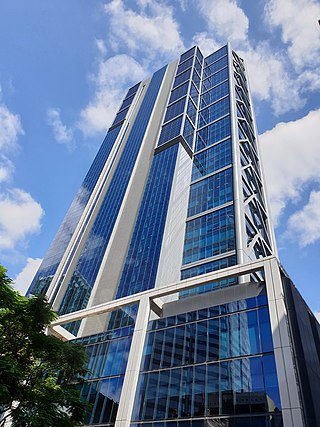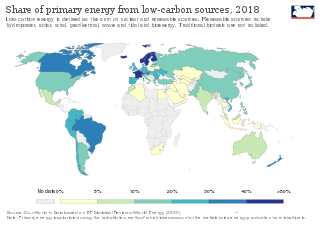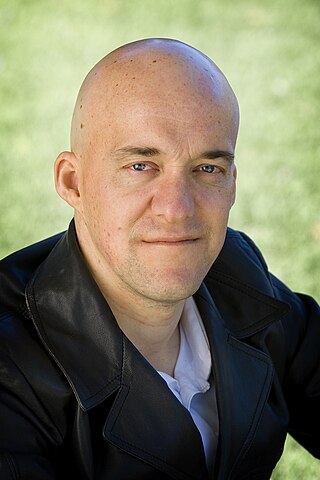
BHP Group Limited, also known as Broken Hill Proprietary Company and formerly as BHP Billiton is an Australian multinational mining and metals public company that was founded in August 1885 and is headquartered in Melbourne.

Energy is sustainable if it "meets the needs of the present without compromising the ability of future generations to meet their own needs." Definitions of sustainable energy usually look at its effects on the environment, the economy, and society. These impacts range from greenhouse gas emissions and air pollution to energy poverty and toxic waste. Renewable energy sources such as wind, hydro, solar, and geothermal energy can cause environmental damage but are generally far more sustainable than fossil fuel sources.
Haydon Manning is an Australian political scientist and Adjunct Professor with the College of Business, Government and Law at The Flinders University of South Australia.

A low-carbon economy (LCE) is an economy which absorbs as much greenhouse gas as it emits. Greenhouse gas (GHG) emissions due to human activity are the dominant cause of observed climate change since the mid-20th century. There are many proven approaches for moving to a low-carbon economy, such as encouraging renewable energy transition, energy conservation, and electrification of transportation. An example are zero-carbon cities.

The energy policy of Australia is subject to the regulatory and fiscal influence of all three levels of government in Australia, although only the State and Federal levels determine policy for primary industries such as coal. Federal policies for energy in Australia continue to support the coal mining and natural gas industries through subsidies for fossil fuel use and production. Australia is the 10th most coal-dependent country in the world. Coal and natural gas, along with oil-based products, are currently the primary sources of Australian energy usage and the coal industry produces over 30% of Australia's total greenhouse gas emissions. In 2018 Australia was the 8th highest emitter of greenhouse gases per capita in the world.

Mark Diesendorf is an Australian academic and environmentalist, known for his work in sustainable development and renewable energy. He currently researches at the University of New South Wales, Australia. He was formerly professor of environmental science and founding director of the Institute for Sustainable Futures at the University of Technology, Sydney and before that a principal research scientist with CSIRO, where he was involved in early research on integrating wind power into electricity grids. His most recent books are The Path to a Sustainable Civilisation (2023) and Sustainable Energy Solutions for Climate Change (2014).

Low-carbon electricity or low-carbon power is electricity produced with substantially lower greenhouse gas emissions over the entire lifecycle than power generation using fossil fuels. The energy transition to low-carbon power is one of the most important actions required to limit climate change.

Nuclear power in Australia has been a topic of debate since the 1930s. Australia has one nuclear reactor (OPAL) at Lucas Heights, New South Wales, which is only used to produce radionuclides for nuclear medicine, and does not produce electricity. Australia hosts 33% of the world's proven uranium deposits, and is currently the world's third largest producer of uranium after Kazakhstan and Canada.

Greenhouse gas emissions by Australia totalled 533 million tonnes CO2-equivalent based on greenhouse gas national inventory report data for 2019; representing per capita CO2e emissions of 21 tons, three times the global average. Coal was responsible for 30% of emissions. The national Greenhouse Gas Inventory estimates for the year to March 2021 were 494.2 million tonnes, which is 27.8 million tonnes, or 5.3%, lower than the previous year. It is 20.8% lower than in 2005. According to the government, the result reflects the decrease in transport emissions due to COVID-19 pandemic restrictions, reduced fugitive emissions, and reductions in emissions from electricity; however, there were increased greenhouse gas emissions from the land and agriculture sectors.
Different methods of electricity generation can incur a variety of different costs, which can be divided into three general categories: 1) wholesale costs, or all costs paid by utilities associated with acquiring and distributing electricity to consumers, 2) retail costs paid by consumers, and 3) external costs, or externalities, imposed on society.

Barry William Brook is an Australian scientist. He is an ARC Australian Laureate Professor and Chair of Environmental Sustainability at the University of Tasmania in the Faculty of Science, Engineering & Technology. He was formerly an ARC Future Fellow in the School of Earth and Environmental Sciences at the University of Adelaide, Australia, where he held the Sir Hubert Wilkins Chair of Climate Change from 2007 to 2014. He was also Director of Climate Science at the Environment Institute.

South Africa has a large energy sector, being the third-largest economy in Africa. The country consumed 227 TWh of electricity in 2018. The vast majority of South Africa's electricity was produced from coal, with the fuel responsible for 88% of production in 2017. South Africa is the 7th largest coal producer in the world. As of July 2018, South Africa had a coal power generation capacity of 39 gigawatts (GW). South Africa is the world's 14th largest emitter of greenhouse gases. South Africa is planning to shift away from coal in the electricity sector and the country produces the most solar and wind energy by terawatt-hours in Africa. The country aims to decommission 34 GW of coal-fired power capacity by 2050. It also aims to build at least 20 GW of renewable power generation capacity by 2030. South Africa aims to generate 77,834 megawatts (MW) of electricity by 2030, with new capacity coming significantly from renewable sources to meet emission reduction targets. Through its goals stated in the Integrated Resource Plan, it announced the Renewable Energy Independent Power Producer Procurement Programme, which aims to increase renewable power generation through private sector investment.

The Olympic Dam mine is a large poly-metallic underground mine located in South Australia, 550 km (340 mi) NNW of Adelaide. It is the fourth largest copper deposit and the largest known single deposit of uranium in the world. Copper is the largest contributor to total revenue, accounting for approximately 70% of the mine's revenue, with the remaining 25% from uranium, and around 5% from silver and gold. BHP has owned and operated the mine since 2005. The mine was previously owned by Western Mining Corporation. Since the 1970s environmentalists, traditional owners and others have campaigned against the mine, largely on the basis of its contribution to the nuclear cycle and its use of underground water.
The United States state of Arkansas is a significant producer of natural gas and a minor producer of petroleum.
UCL Australia was an international campus of the University College London, located on Victoria Square in Adelaide, South Australia. It had three parts: the School of Energy and Resources (SERAus), the International Energy Policy Institute (IEPI) and a branch of UCL's Mullard Space Science Laboratory. UCL Australia described its university community as "welcoming, dynamic and influential." The campus closed in December 2017.

Tony Irwin is a nuclear engineer and technical director of Australian company, SMR Nuclear Technology. For three decades he worked commissioning and operating nuclear reactors in the UK for British Energy. He emigrated to Australia in 1999 and took a position with the Australian Nuclear Science and Technology Organisation (ANSTO), where he remained for ten years. Irwin chairs the Nuclear Engineering Panel of Engineers Australia and lectures at the Australian National University and University of Sydney on nuclear science. Irwin has a degree in electrical power engineering.
Thomas Quirk is a corporate director of biotech companies and former board member of the Institute of Public Affairs, an Australian conservative think-tank for which he has written numerous articles and papers and provided comments to the media. Quirk joined the board of therapeutics company Sementis in 2011 as a non-executive director. Quirk is an occasional speaker on the topic of innovation in Australia, and has written extensively on subjects of energy policy and climate change. He is a former member of the Australian Climate Science Coalition's Scientific Advisory Panel. Quirk is a critic of Tim Flannery, the Climate Commission and environmentalists generally.
Anthony 'Tony' David Owen is an economist and academic, currently employed as Emeritus Professor in Energy Economics at University College London Australia. He was appointed to the position in July 2013, and was previously Academic Director of the School of Energy and Resources at its campus in Adelaide, Australia. He also held the Santos Chair in Energy Resources at the time. He previously held positions at Curtin University of Technology and the University of New South Wales, and worked as a consultant and visiting appointee in North America, Europe and Asia. In 2007 he chaired the Inquiry into Electricity Supply in New South Wales. Owen wrote a book entitled The economics of uranium, which was published by Praeger in 1985. Since then, Owen has written periodically on the possibility of nuclear power in Australia, including for the Committee for Economic Development of Australia in 2011. His academic papers have featured in peer-reviewed journals such as Energy Policy, Economic Record, Agenda and the Journal of Nuclear Research and Development. He also edited the book The Economics of Climate Change with Nick Hanley which was published by Routledge, London in 2004.
Benjamin "Ben" Heard is a South Australian environmental consultant and an advocate for nuclear power in Australia, through his directorship of environmental NGO, Bright New World.
Timothy John Stone, CBE is a British businessman and senior expert adviser with interests in infrastructure, finance, nuclear power and water supply. He is a non-executive director of the Arup Group, chairman of Nuclear Risk Insurers and former non-executive director of Horizon Nuclear Power and a former senior expert non-executive director on the board of the European Investment Bank. He was also a non-executive director of Anglian Water from 2011 to 2015. He was appointed Chair of the UK's Nuclear Industry Association in October 2018.











